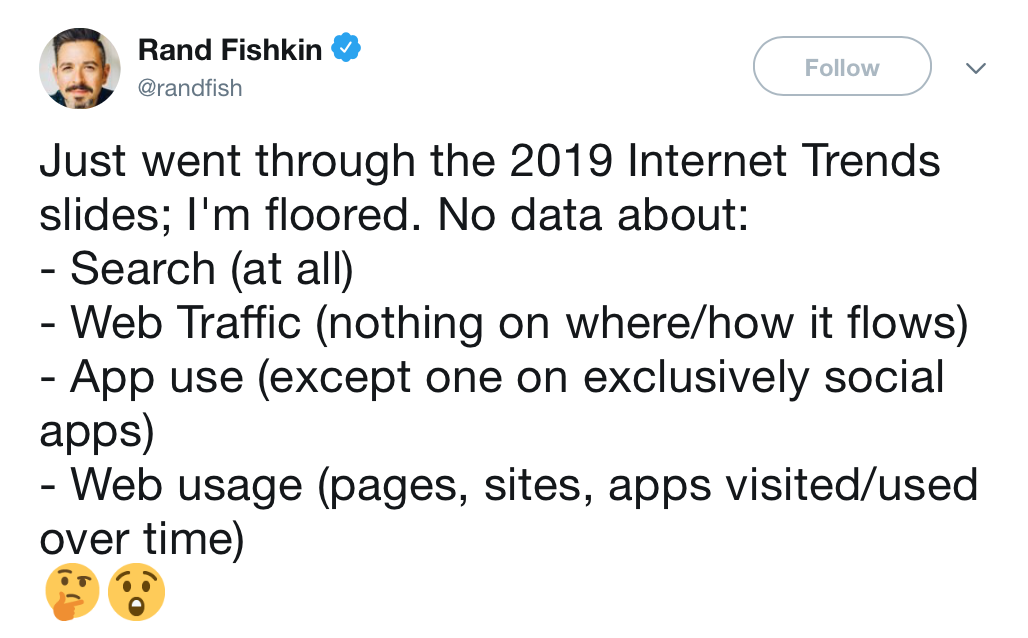3 min read
Honchō Scoops Up Two UK Search Awards!
It’s official, we've added not one, but two shiny trophies to our awards cabinet! We’re over the moon to share that we’ve triumphed at the UK Search...
4 min read
 Jade Halstead
:
Jun 12, 2019 11:24:20 AM
Jade Halstead
:
Jun 12, 2019 11:24:20 AM

Strong themes this year include: social media use, freemium models, ad spend, and customer experience.
Mary Meeker – Bond Capital founder and “Queen of the Internet” – has just unveiled the findings of her much anticipated annual Internet Trends Report at Conference Code 2019. If you’re in the internet business, this report can be a huge guidance and insight into the ever-changing online world, especially as the report highlights that over half (51%) of the world’s population are now online. This is up from 49% in 2017 which may not sound huge on a first glance, but that’s 154 million more people online!
You don’t have to be a complete data geek and read all 333 slides; we’ve done that for you. Here are our 8 key highlights from the report as a condensed version of everything you need to know:
Maybe the death of the highstreet isn’t so as e-commerce continues to grow, but at a slower rate than before. E-commerce now equates for 15% of all total retail sales, which has slowed; being up 12.4% in Q1 compared with the previous year, but down from the 15%-20% in previous years. Find out the SEO mistakes e-commerce sites are making here.
Ad spending increased by over a fifth (22%) in the last year – with Google and Facebook (as you’d expect!) taking the largest chunks. Although we can see shares increase on other platforms like Amazon and Twitter too. Worth noting that mobile advertising has continued to rapidly increase; reflecting the popularity of mobile shopping amongst consumers.
Amazon Prime, Netflix, ASOS, Spotify; just some of the biggest players on a subscription model with their users. But is the customer acquisition costs (CAC) of these effective? Probably not: the CACs are going up. Meeker’s 2019 report highlights the value that freemium models bring, and suggests they bring long term conversions as they allow the users to access limited versions of services and be tempted or see the value before subscribing to paid. In the report, Eric Yuan, Founder of Zoom says: “It’s really hard to get customers to try Zoom without a freemium product… if they like our product, very soon they are going to pay for the subscription.”
It’s been common knowledge that the smartphone market has slowed down for some time. The yearly growth dell again last year, likely because smartphone ownership is so high that we have no need to upgrade as quickly as we used to. However, marketers beware: with most of us owning more than two smart devices (laptops, tablets and phones) it doesn’t mean usage is falling flat overall.
Worldwide, the number of people owning Amazon Echo devices in their home has doubled to over 47million in the last four years. This is a significant number of people searching the internet with voice and it will only continue to grow as more devices become interlinked in the connected home.
Shock! In all seriousness, it’s important to see how consumer habits are shifting. After initial concerns with trust that were pinpointed to be age and generation-related, it’s interesting to see how quickly these attitudes are shifting with the number of online banking users skyrocketing. Nikolay Storonsky, CEO and Co-Founder of Revolut says: “Personalisation, with the help of data and technology, will allow people to have all their financial needs covered.” With more consumers trusting online payment methods and banking, this should positively impact the e-commerce and retail industry.
Apple recently introduced features that allow its users to map and monitor screen and social media use, after it becoming a big part of the mental health conversation. Mary’s report highlighted a user concern of overload and burnout after finding that 26% of US adults claim to be online “almost constantly”. Apple, Google, Facebook and YouTube have all introduced their own usage monitors to help users track time.
Almost half (46%) say that consumer/peer reviews make them feel more confident about purchases. With consumers joining the online conversation around a brand, service or product, it makes companies more accountable to consumers. Brian Chesky, CEO of Airbnb understands the importance of reviews for building his brand’s presence and profile: “70% of guests when they stay on Airbnb, leave a review, which means that we’ve built a system that allows the community to review properties on Airbnb and build trust.”
When you live and breathe Google and search, an anticipated report like this can provide huge insight and even mould digital marketing strategies based on users’ internet trends.
Could the report have provided more insight on traffic and search intent though for SEOs and Paid Media experts to understand internet usage? Perhaps. And this has naturally left mixed reviews on Twitter:

What Mary Meeker’s 2019 Internet Trends Report does equip us with though, is the knowledge around ever-changing consumer habits. From the key takeaways above, we have clearly evolved as a society and become completely on-demand consumers, living in an always-on economy. More than 25% of US adults have admitted to being “almost always” online in the report!
Evidently from the stats on ad spend, prevalence of voice search, and slowed growth of e-commerce, those in SEO, PPC and Content need to adapt online approaches and strategies to give consumers the personalised and streamlined experience that they crave and favour. This is what will set certain brands apart from competitors and appeal to the consumer.
On the same note, the online conversation and available content is also becoming more difficult to control. The power to amplify negative and bad content on a large scale is easier for the public with the growing popularity of social media, comments sections, and sites like YouTube. Meeker warned that problematic content on the internet can be less filtered and more amplified, and as such “the number of media outlets focusing on fact-checking and political accountability has grown rapidly.
Citizen journalism is allowing more of us to control and pollute the online conversation, but this makes it more difficult for brands to have a monopoly or share of voice on. Tough right?
The underlying theme and crux of this report to us is customer experience. Taking the findings forward, brands should consider not just how their audience is using the internet but also when and why to really tap into the consumer mindset.
We’re interested to hear your thoughts and key takeaways too. Read the full Mary Meeker Internet Trends Report below, and join in the conversation with us on Twitter.

3 min read
It’s official, we've added not one, but two shiny trophies to our awards cabinet! We’re over the moon to share that we’ve triumphed at the UK Search...

5 min read
Understand ecommerce attribution models which attribution models can maximise your marketing efforts and ROI.

3 min read
Explore how social commerce is changing the way we shop online, blending social interactions with digital commerce for a seamless buying experience.